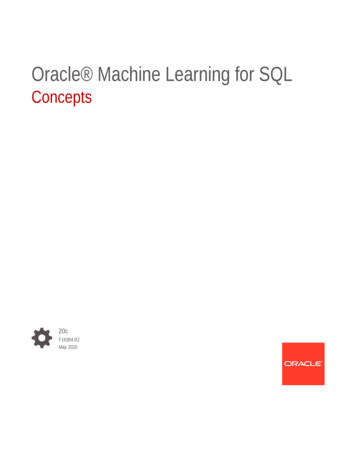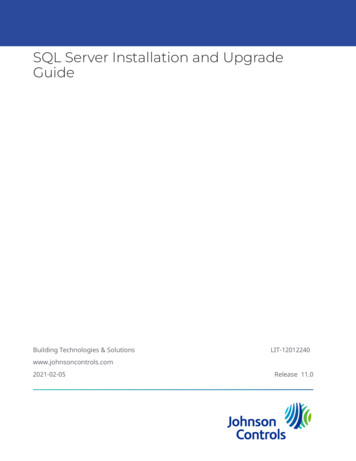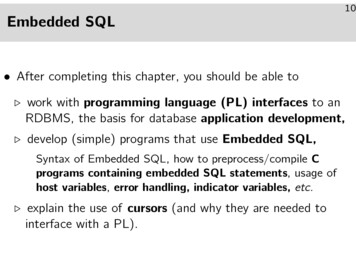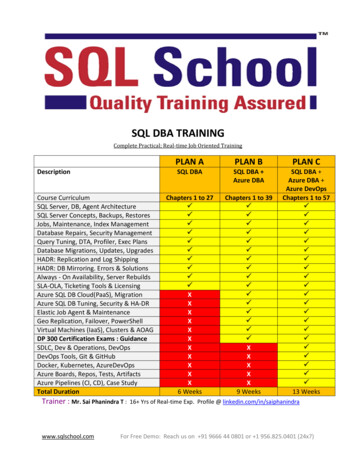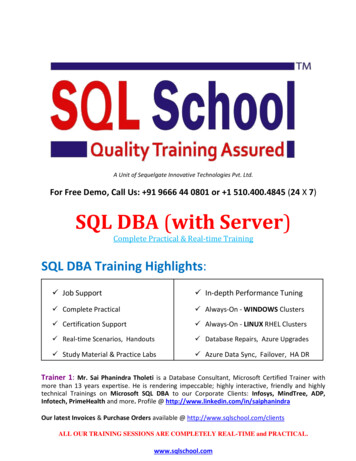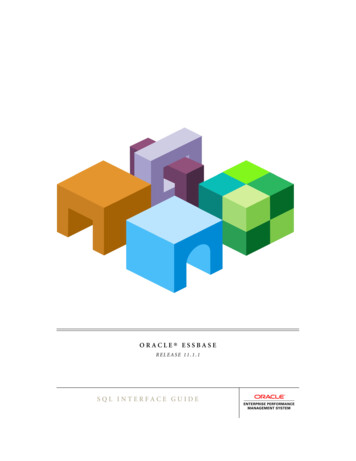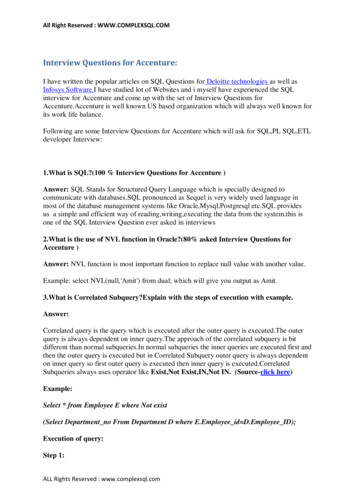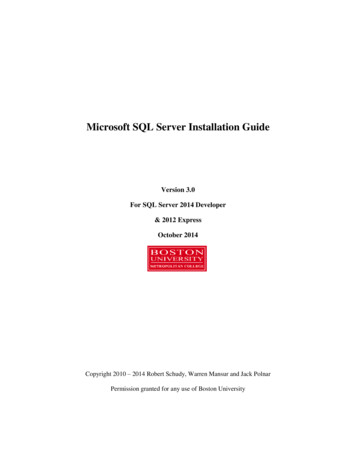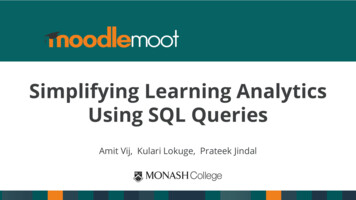
Transcription
Simplifying Learning AnalyticsUsing SQL QueriesAmit Vij, Kulari Lokuge, Prateek Jindal
HistoryMoodle is open source.It was built for learning.The world’s most popular learning platform, with over 153,000,000 users worldwide.It was built to perform, not to run analytics*Analytics have been only a recent addition in later versions of Moodle.Most documentation explains how to use Moodle, not how to understand the internals.source: https://moodle.com/
Database Types supported by Moodle(source: https://docs.moodle.org/37/en/Installing Moodle#Create an empty database)
All Databases are not same!
All SQL is not same!Although core SQL statements seem similar, there are subtle differencesbetween different database types as you write complex queries and startusing inbuilt functionsExample: to work with datetime timestamps, now() vs today() vs getdate()
Have you ever written a SQL Query?SELECT columns FROM table WHERE condition
Where to run SQL Queries?Configurable Reports block (plugin)PgAdmin (PostgreSQL environment)SQL Server Management Studio (MS SQLServer Environment)Note:1. You may not be allowed to run queries directly on yourProduction/live site.2. Make friends with your IT / Business Intelligence /Analytics teams. They might let you use a DataWarehouse.Source: https://docs.moodle.org/37/en/Configurable reports
Writing SQL Queries can feel like Source: http://techgenix.com/data-fabric/
Moodle Database Overview- Moodle Database has 100s of tables- Main/core entities: course, user, grade, assignments, quizzes, forums etc.- Table names are grouped, eg. quiz related information is in tables namedmdl quiz *- This can help reduce the hundreds of tables to 10s of groups- Every Activity (assign, quiz, forum etc.), usually* has a corresponding activitysubmission or attempt, activity grade. Exception – resources, files etc.- Grades have grade categories, grade items, grade history
Enrolmentsmdl enrolmdl user enrolmentsCoursesmdl usermdl user lastaccessQuizzesmdl coursemdl course categoriesmdl course sectionsmdl course modulesmdl quizmdl quiz attemptsmdl quiz gradesGradesAssignmentsmdl grade categoriesmdl grade itemsmdl grade gradesOther activity typesmdl activitytype mdl activitytype attemptsmdl activitytype gradeshttp://www.examulator.com/er/Usersmdl assignmdl assign submissionmdl assign grades
Every interaction by every user is in the logmdl logstore standard reated Note: Check your log size, it can impact the query run time significantly!
SQL Join is your friend Don’t be afraid to join multiple tables –think like chains/links Start small – who are the students in mycourse/unit/subject? Find anchors or reference values tostart. Eg- pick a courseid (the number orkey in the url when you open yourcourse main page) such as your moodlesite /course/view.php?id number Source: Quora
Query Optimisation is a scienceProblem of size/scale with some tables, queries can take timeThumb rule: any query that takes longer than 2 minutes to run/complete should be improved .Queries on the log are slowest (mdl logstore standard log)My log table has 120 million rows! A select query joining the log table with the user table for aparticular course can take 10 minIndexing can speed things upHint: Moodle database schema already uses indexing on many tables. Re-use it if needed.If your query requires you to join particular combination of tables again andagain, try creating a temporary table or a result-setEg – WITH JOINEDTEMPTABLE AS (SELECT * FROM A JOIN B JOIN C) SELECT FROM JOINEDTEMPTABLE
Learning Analytics ! Predictive ModelsLearning Analytics is more than just predictive data models“Learning analytics is the measurement, collection, analysis and reporting ofdata about learners and their contexts, for purposes of understanding andoptimizing learning and the environments in which it occurs.”(George Siemens, LAK2011)The data can tell anything. You have to ask the right question.(unknown?)
Scenarios1. Student Grades2. Quiz Submissions3. Weekly Clicks4. Clicks per Week per Resource5. Submissions per Week
Student Grades
SampleGradebookSetup Page
Sample Output
Quiz Submissions
Sample Output
Weekly Clicks
Sample Output
Clicks per Week per Resource
Sample Output
Submissions per Week
Sample Output
Solution ArchitectureSQL Queriesrun here
QnA and ttps://docs.moodle.org/29/en/Learning e reports (configurable reports plugin)https://docs.moodle.org/29/en/ad-hoc contributed reports (includes newer versions)http://www.examulator.com/er/ (ER diagram)https://docs.moodle.org/dev/Database schema introduction (quite old)https://docs.moodle.org/37/en/Installing Moodle#Create an empty databaseQuora (SQL Joins)Contact u
Simplifying Learning Analytics Using SQL Queries. History Moodle is open source. It was built for learning. The world's most popular learning platform, with over 153,000,000 users worldwide. . Learning Analytics is more than just predictive data models "Learning analytics is the measurement, collection, analysis and reporting of .
